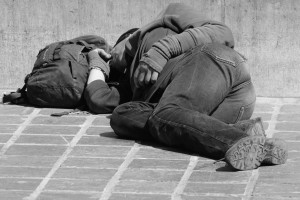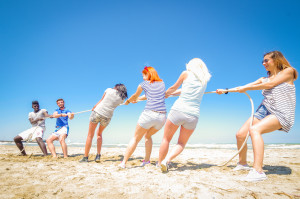Contributor: Crystal Karges, MS, RDN, IBCLC, Special Projects Coordinator at Eating Disorder Hope/Addiction Hope
 For students embarking on their college careers, there are many expectations in terms of goals, including academics, career, and social life. Some students go into college placing more emphasis on their social experience and utilize much of their free time in going out with others or participating in outside activities. Yet other students may feel a rush of freedom from newfound independence and quickly begin testing boundaries and limitations in the college setting. College is generally seen as a time of exploration in many aspects, including academically and socially, where an individual has new experiences and comes into their own being.
For students embarking on their college careers, there are many expectations in terms of goals, including academics, career, and social life. Some students go into college placing more emphasis on their social experience and utilize much of their free time in going out with others or participating in outside activities. Yet other students may feel a rush of freedom from newfound independence and quickly begin testing boundaries and limitations in the college setting. College is generally seen as a time of exploration in many aspects, including academically and socially, where an individual has new experiences and comes into their own being.
College Offers Independence
 The atmosphere of many college campuses is one that is typically conducive to a student’s independence. Depending on the structure of the college campus and the surrounding community, students may have more opportunities for social activities than others. Partying and going out is something that can occur regardless of the campus that students may find themselves in, and students eager to break into this social realm can usually find a means for doing so.
The atmosphere of many college campuses is one that is typically conducive to a student’s independence. Depending on the structure of the college campus and the surrounding community, students may have more opportunities for social activities than others. Partying and going out is something that can occur regardless of the campus that students may find themselves in, and students eager to break into this social realm can usually find a means for doing so.
The consumption of alcohol is certainly not a foreign concept to college students, and many individuals may define this time of their life by parties, social events, and recreational activities that somehow involved alcohol. Whether a student actually chooses to drink alcohol or not, college-aged students will likely experience the effects of drinking in one form or another. According to the National Institute on Alcohol Abuse and Alcoholism (NIAAA), about four out of five college students drink alcohol, and about half of college students who drink also consume alcohol through binge drinking [1].
Binge Drinking
 Binge drinking is a behavior that should be taken seriously, as many risks and consequences can result. The NIAAA has defined binge drinking as a pattern of drinking that brings blood alcohol concentration levels to 0.08 g/dL. This is equivalent to about 4 drinks for women and 5 drinks for men in a relatively short period of time, typically about 2 hours.
Binge drinking is a behavior that should be taken seriously, as many risks and consequences can result. The NIAAA has defined binge drinking as a pattern of drinking that brings blood alcohol concentration levels to 0.08 g/dL. This is equivalent to about 4 drinks for women and 5 drinks for men in a relatively short period of time, typically about 2 hours.
Binge drinking may happen unintentionally. It can begin as casually as getting together with a group of friends for drinks on the weekend or during a social gathering for a celebratory event. Whereas some individuals may have a drink or two before stopping, college students who binge drink will consume several drinks in a short amount of time. The consequences of binge drinking are devastating and can include aggressive and violent behavior, alcohol poisoning, accidents/falls, mental health issues, and fatality.
Black-Out
 Many students may also experience “blacking-out”, or a period of time in which an individual cannot remember details and entire events due the impairment from alcohol. Blacking out is a serious incidence that can put a person in an extremely vulnerable situation. Students are more likely to experience assault, theft, and life-threatening accidents when intoxicated by high levels of alcohol. Blackouts can lead to more long-term brain damage, as basic functions within the brain are impaired by alcohol.
Many students may also experience “blacking-out”, or a period of time in which an individual cannot remember details and entire events due the impairment from alcohol. Blacking out is a serious incidence that can put a person in an extremely vulnerable situation. Students are more likely to experience assault, theft, and life-threatening accidents when intoxicated by high levels of alcohol. Blackouts can lead to more long-term brain damage, as basic functions within the brain are impaired by alcohol.
If you have experienced a blackout on campus due to binge drinking, do the best you can to practice self-care and help yourself recover. If you are unclear about what may have happened to you or are concerned about things that may have occurred during your blackout, try filling in the gaps from trusted friends that may have been with you during the binge drinking episode. If you suspect that you have been assaulted in any way, consider reaching out for professional help immediately to address any concerns that may have resulted. Addressing any occurrences as early as possible can help you slowly recover the pieces during the time you may have blacked out. Preventing black-outs from occurring is also important to prevent reoccurring problems. If you are struggling with binge drinking, consider taking the appropriate steps needed to address the root of the problem, which begins by seeking out professional help and assistance.
Community Discussion – Share your thoughts here!
Blacking out after binge drinking can put a person in a dangerous and vulnerable situation. What are suggestions you might have to prevent this from happening? What resources are available on your campus to help students who may be struggling with binge drinking and/or alcoholism?
References:
- National Institute on Alcohol Abuse and Alcoholism, “College Drinking”, http://www.niaaa.nih.gov/alcohol-health/special-populations-co-occurring-disorders/college-drinking Accessed 22 August 2015
The opinions and views of our guest contributors are shared to provide a broad perspective of addictions and co-occurring disorders. These are not necessarily the views of Addiction Hope, but an effort to offer a discussion of various issues by different concerned individuals. We at Addiction Hope understand that addictions result from a combination of environmental and genetic factors. If you or a loved one are suffering from an addiction, please know that there is hope for you, and seek immediate professional help.
Last Updated & Reviewed By: Jacquelyn Ekern, MS, LPC on September 18, 2015. Published on AddictionHope.com
